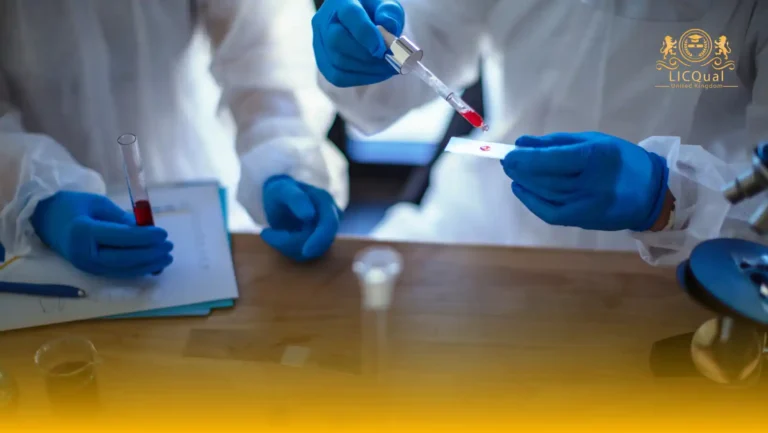The LICQual Level 6 Diploma in Pediatric Nutrition (Dip Pediatric Nutrition) is a specialised qualification designed for professionals seeking advanced knowledge and practical expertise in the nutrition of infants, children, and adolescents. This diploma equips learners with a comprehensive understanding of growth and development, dietary requirements, and evidence-based nutritional strategies that support the health and wellbeing of young populations.
This qualification is ideal for healthcare practitioners, paediatric dietitians, nutritionists, nurses, and allied health professionals who wish to enhance their career prospects, expand their knowledge, and fulfil Continuing Professional Development (CPD) requirements. Learners will gain the skills to assess nutritional status, design personalised dietary interventions, and apply scientific research to optimise health outcomes across different stages of childhood. The programme also addresses the management of clinical conditions, feeding challenges, and the impact of nutrition on cognitive and physical development.
Centres delivering the Level 6 Diploma in Pediatric Nutrition are required to maintain the highest standards of education. This includes employing competent and qualified staff, providing access to all essential learning resources, and creating a supportive environment that ensures learner success. Structured teaching, practical applications, and rigorous assessment ensure that learners develop the confidence and expertise needed to excel in paediatric nutrition roles.
By completing the LICQual Level 6 Diploma in Pediatric Nutrition, learners not only strengthen their professional knowledge and practical skills but also demonstrate a commitment to ongoing professional growth. This qualification is suited for those aiming for leadership roles, specialised practice, consultancy, or advanced career opportunities in paediatrics, healthcare, and nutrition sectors.
Course Overview
Qualification Title
LICQual Level 6 Diploma in Pediatric Nutrition (Dip Pediatric Nutrition)
Total Units
6
Total Credits
120
GLH
480
Qualification #
LICQ2201064
Qualification Specification
To enroll in the LICQual Level 6 Diploma in Pediatric Nutrition (Dip Pediatric Nutrition), applicants must meet the following criteria:
|
Qualification# |
Unit Title |
Credits |
GLH |
|---|---|---|---|
|
LICQ2201064-1 |
Advanced Pediatric Growth and Development |
20 |
80 |
|
LICQ2201064-2 |
Pediatric Nutritional Assessment |
20 |
80 |
|
LICQ2201064-3 |
Clinical Pediatric Nutrition and Dietary Interventions |
20 |
80 |
|
LICQ2201064-4 |
Nutritional Science and Functional Foods in Pediatrics |
20 |
80 |
|
LICQ2201064-5 |
Research Methods and Evidence-Based Pediatric Nutrition |
20 |
80 |
|
LICQ2201064-6 |
Professional Practice, Ethics, and Leadership in Pediatric Nutrition |
20 |
80 |
By the end of this course, learners will be able to:
Unit 1: Advanced Pediatric Growth and Development
By the end of this unit, the learner will be able to:
- Explain the physical, cognitive, and emotional development stages from infancy to adolescence
- Analyse the nutritional requirements at different stages of growth and development
- Evaluate growth patterns using standard developmental and anthropometric measures
- Assess the impact of nutrition on long-term health and developmental outcomes
Unit 2: Pediatric Nutritional Assessment
By the end of this unit, the learner will be able to:
- Conduct comprehensive nutritional assessments for infants, children, and adolescents using anthropometric, biochemical, clinical, and dietary methods
- Analyse and interpret growth charts and reference standards to identify nutritional issues
- Identify malnutrition, nutrient deficiencies, and overnutrition in paediatric populations
- Apply assessment findings to inform evidence-based nutritional planning
Unit 3: Clinical Pediatric Nutrition and Dietary Interventions
By the end of this unit, the learner will be able to:
- Design personalised nutrition plans for both healthy and clinical paediatric populations
- Develop dietary strategies to manage feeding challenges, allergies, and chronic conditions
- Evaluate nutrition therapy approaches for obesity, diabetes, gastrointestinal, and metabolic disorders
- Monitor, review, and adjust dietary interventions to optimise child health outcomes
Unit 4: Nutritional Science and Functional Foods in Pediatrics
By the end of this unit, the learner will be able to:
- Explain the roles of macro- and micronutrients in child health and development
- Critically evaluate the use of functional foods, supplements, and bioactive compounds for paediatric populations
- Assess the safety and efficacy of nutritional interventions in children
- Apply scientific research to inform evidence-based paediatric nutrition practice
Unit 5: Research Methods and Evidence-Based Pediatric Nutrition
By the end of this unit, the learner will be able to:
- Apply quantitative and qualitative research methods in paediatric nutrition studies
- Critically appraise scientific literature and clinical trials for reliability and applicability
- Interpret research data to support evidence-based nutrition strategies
- Implement evidence-based practice to improve paediatric health and nutritional outcomes
Unit 6: Professional Practice, Ethics, and Leadership in Pediatric Nutrition
By the end of this unit, the learner will be able to:
- Demonstrate professional and ethical standards in paediatric nutrition practice
- Apply leadership, management, and consultancy principles in healthcare and paediatric settings
- Communicate effectively with children, families, caregivers, and multidisciplinary teams
- Plan and engage in Continuing Professional Development (CPD) to advance career progression
The LICQual Level 6 Diploma in Pediatric Nutrition is ideal for professionals and enthusiasts seeking advanced knowledge in child nutrition. This course equips learners with practical skills to support healthy growth, manage pediatric dietary needs, and provide evidence-based nutrition guidance.
Nutritionists and Dietitians
- Develop advanced expertise in pediatric dietary planning
- Assess and monitor nutritional needs for different age groups
- Create personalized meal plans for children with special needs
- Implement evidence-based feeding strategies
- Support parents and caregivers with practical nutrition guidance
- Enhance professional credibility with an internationally recognized qualification
Healthcare Professionals
- Apply clinical nutrition principles in pediatric care
- Manage nutrition-related conditions in infants and children
- Support multidisciplinary healthcare teams with dietary advice
- Learn strategies to prevent nutrient deficiencies and growth issues
- Gain practical skills for patient-centered nutrition interventions
- Prepare for advanced roles in pediatric healthcare and wellness
Educators and Early Years Practitioners
- Understand the impact of nutrition on child development and learning
- Plan healthy meals and snacks in schools and childcare settings
- Promote lifelong healthy eating habits in children
- Manage feeding challenges and picky eating effectively
- Integrate nutrition education into teaching programs
- Support overall wellness and development in early years
Students and Career Advancers
- Gain an internationally recognized Level 6 qualification
- Build advanced knowledge in pediatric nutrition and dietetics
- Develop practical skills applicable in healthcare, education, or wellness
- Prepare for postgraduate studies or specialized training
- Increase employability in hospitals, clinics, and childcare sectors
- Learn to design evidence-based nutrition programs for children
Fitness and Wellness Professionals
- Understand how nutrition affects growth, performance, and wellbeing
- Provide dietary advice for young athletes and active children
- Develop nutrition plans that support energy and recovery
- Learn strategies to optimize child health through diet
- Gain practical skills for family and client consultations
- Stay updated with current research in pediatric nutrition
Caregivers and Parents
- Learn practical strategies for child feeding and nutrition
- Understand essential nutrients for growth and development
- Plan balanced meals for children at home
- Manage dietary challenges and allergies safely
- Promote healthy eating habits for long-term wellness
- Gain confidence in supporting child health and nutrition
Pediatric Nutrition Consultants and Entrepreneurs
- Offer expert pediatric nutrition services to families or institutions
- Develop nutrition programs for schools, clinics, or wellness centers
- Provide evidence-based advice on child health and diet
- Build credibility as a specialist in pediatric nutrition
- Learn regulatory and safety standards for nutrition consultancy
- Expand career opportunities in healthcare and wellness sectors
To deliver the LICQual Level 6 Diploma in Pediatric Nutrition (Dip Pediatric Nutrition) effectively, centres must meet the following requirements to ensure high-quality training and learner success:
- Qualified and Competent Staff: All teaching and assessment staff must hold relevant qualifications in paediatric nutrition, dietetics, health sciences, or related healthcare fields, with substantial professional experience. Staff should demonstrate the ability to deliver Level 6 curriculum content and support learners in achieving learning outcomes.
- Comprehensive Learning Resources: Centres must provide learners with access to essential learning materials, including textbooks, research journals, online databases, clinical tools, and multimedia resources that support evidence-based paediatric nutrition practice.
- Facilities and Equipment: Centres should have classrooms, laboratories, and practical spaces suitable for interactive learning, workshops, and hands-on assessments. Access to IT resources, computers, and reliable internet connectivity is essential.
- Assessment and Quality Assurance: Centres must implement robust assessment processes aligned with Level 6 standards, ensuring assessments are fair, valid, and reliable. Quality assurance procedures should be in place to monitor teaching effectiveness and learner progress.
- Learner Support: Centres should provide guidance on study skills, access to tutors, and advice on professional development opportunities to support learners throughout the programme.
- Commitment to Continuing Professional Development (CPD): Centres must encourage CPD for both staff and learners, promoting ongoing skills development and career progression.
- Regulatory Compliance: Centres must adhere to all relevant health, safety, and educational regulations, ensuring a safe, professional, and conducive learning environment.
Meeting these requirements ensures learners receive high-quality education, develop advanced paediatric nutrition competencies, and achieve their full potential in professional practice.
Assessment and Verification
All units within this qualification are subject to internal assessment by the approved centre and external verification by LICQual. The qualification follows a criterion-referenced assessment approach, ensuring that learners meet all specified learning outcomes.
To achieve a ‘Pass’ in any unit, learners must provide valid, sufficient, and authentic evidence demonstrating their attainment of all learning outcomes and compliance with the prescribed assessment criteria. The Assessor is responsible for evaluating the evidence and determining whether the learner has successfully met the required standards.
Assessors must maintain a clear and comprehensive audit trail, documenting the basis for their assessment decisions to ensure transparency, consistency, and compliance with quality assurance requirements.







